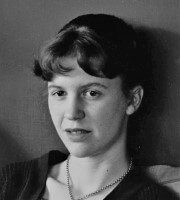by Andrew Motion
By noon your breathing had changed from normal
to shallow and panicky. That’s when the nurse said
Nearly there now, in the gentle voice of a parent
comforting a child used to failure, slipping her arms
beneath your shoulders to hoist you up the pillows,
then pressing a startling gauze pad under your jaw.
Nearly there now. The whole world seemed to agree—
as the late April sky deepened through the afternoon
into high August blue, the vapour trails of two planes
converged to sketch a cross on the brow of heaven.
My brother Kit and I kept our backs turned to that
except now and again. It was the room I wanted to see,
because it contained your last example of everything:
the broken metal window-catch that meant no fresh air;
your toothbrush standing to attention in its plastic mug;
the neutral pink walls flushed into definite pale red
by sunlight rejoicing in the flowering cherry outside;
your dressing-gown like a stranger within the wardrobe
eavesdropping. That should have been a sign to warn us,
but unhappiness made us brave, or do I mean cowardly,
and Kit and I talked as if we were already quite certain
you could no longer hear us, saying how easy you were
to love, but how difficult always to satisfy and relax—
how impossible to talk to, in fact, how expert with silence.
You breathed more easily by the time we were done,
although the thought you might have heard us after all,
and our words be settling into your soft brain like stones
onto the bed of a stream—that made our own breathing
tighter. Then the nurse looked in: Nothing will change
here for a while boys, and we ducked out like criminals.
I was ordering two large gins in the pub half a mile off
when my mobile rang. It was the hospital. You had died.
I put my drink down, then thought again and finished it.
Five minutes later we were back at the door of your room
wondering whether to knock. Would everything we said
be written on your face, like the white cross on the heavens?
Of course not. It was written in us, where no one could find it
except ourselves. Your own face was wiped entirely clean—
and so, with your particular worries solved, and your sadness,
I could see more clearly than ever how like mine it was,
and therefore how my head will eventually look on the pillow
when the wall opens behind me, and I depart with my failings.




